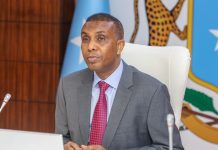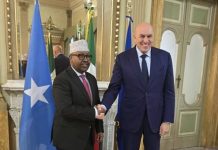United Nations Permanent Representative in New
York has appealed directly to the Obama administration for support for
Kenya’s incursion of Somalia to root out Al Shabaab Islamist rebels.In diplomacy reflective of President Kibaki’s strategy of courting
international support for the war in Somalia, Ambassador Macharia
Kamau early last week made a rare appearance at the Capitol Hill, the
seat of congressional power to make a case for Washington’s support of
the war.“We would love to see the international community, with the US right
up there, engaging in Somalia in ways in which they have not for quite
a long time,” Ambassador Macharia Kamau told the press in Washington,
DC soon after meeting some members of US congress.Kenya deployed tanks and troops to the
Al Shabaab-controlled southern Somalia on October 14 to fight the
Al-Qaeda-linked rebels the country blames for kidnapping foreigners
and making cross-border raids thus disturbing the peace and
threatening the tourism industry.“We would like to see the US and the international community taking
advantage of basically what Kenya is doing, which is putting troops on
the ground, taking risks that need to be taken to achieve the goals
that we all say need to be achieved, which is to bring peace and
security to Somalia,” said Ambassador Kamau.But, Pentagon officials told National Public Radio’s (NPR) Michelle
Kelemen in an interview broadcast over the weekend that the US is
monitoring the Kenyan incursion, but not providing assistance.The State Department is advising caution, said Donald Yamamoto,
principal deputy assistant secretary of state for Africa.“You don’t know what the consequences are going to be,” he said. “Look
at the Ethiopian incursion into Somalia, look at our own personal
history. It’s fraught with a lot of problems and dangers. The Somalis
just do not like foreigners in their area.”Yamamoto said Kenya’s motivations were understandable, but the US has
tried to keep focused on beefing up the African Union forces,
supporting a transitional government and reaching out to major clans.“The overall issue and solution to the Somalia problem is going to
have to be a regional, concerted approach, [an] international
approach, but also ultimately the Somalis themselves will have to
resolve this,” Yamamoto said.Ambassador Kamau’s courting of lawmakers in DC among them Democratic
Senator Al Franken and Democratic Representative Keith Ellison of
Minnesota, seems to be bearing fruits. Late last week as a result of
Mr Kamau’s briefing, Representative Keith Ellison of Minnesota, a
state with a vast Somali-American community that Al Shabaab has tapped
for recruits, made a presentation in the House of Representatives
asking the US government to help Kenya deal with the Al Shabaab menace
once and for all.Making reference to these links, Mr Kamau said Al Shabaab was training
over 40 known American citizens in Somalia, warning that there was a
direct line from the group right back to American cities that poses a
clear and present danger for Americans.“We should never forget that what’s going on in Somalia, while it
might appear to be far away, out in the middle of nowhere, has
tentacles that stretch back to the United States,” he cautioned.Ambassador Kamau made a fresh appeal to the United States to consider
imposing a blockade on the rebel-held Somali port of Kismayu to choke
off the rebels’ supply line, a move Washington has been reluctant to
support.“Why this has not happened is actually a little bit beyond us because
it does not require any troops on the ground, neither does it really
put anyone at any risk,” he said.“It’s really a question of moving their naval assets into positions
that would ensure that these people are not able to continue to supply
through Kismayu,” which is an Al Shabaab “nerve center,” he said.The envoy said Kenyan forces had cleared rebels out of towns and areas
they once controlled and suggested that “maybe the international
community might take advantage of that to send down peacekeeping
troops to ensure that these towns and areas are not re-infiltrated by
the armed groups and terrorist elements.”US officials said Kenya has been making what one senior senate source
called “a full-court press” for Washington’s help on Somalia and
against the Al Qaeda linked Al Shabaab, with top diplomats reaching
out to key lawmakers for help.The ambassador said he would also meet with non-governmental
organizations in Washington in a bid to improve the flow of
humanitarian aid into Somalia.And he reminded US lawmakers wary of fresh commitments at a time of
belt-tightening that “Kenya itself is not in the best of economic
times.”“But we ourselves have recognized that all our collective long-term
interests demand that we make the necessary sacrifices now, because if
we don’t, then the price that we shall pay, collectively, as an
international community, whether Europe, Asia, or the United States,
could be quite severe,” he said.The month-old incursion caught the United States and others off guard
and has raised alarm among aid groups.Speaking on National Public Radio (NPR) over the weekend, ambassador
Kamau said, “We surprised ourselves. We have never in our history
engaged in any kind of foreign adventure of a military sort. But I
think what it is, is that matters did come to a head.”“When you are dealing with a violent group of murderous individuals,
you have to come to a point where you make a decision: Do you continue
to allow the slow bleed to happen, so that the country becomes
completely anemic and unable to function, or do you, after 25 years of
living next to a failed state, make a decision that you can no longer
afford to tolerate the situation?” he asked.






